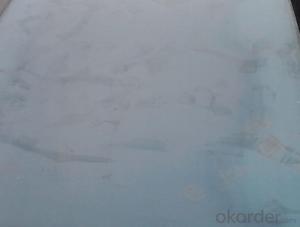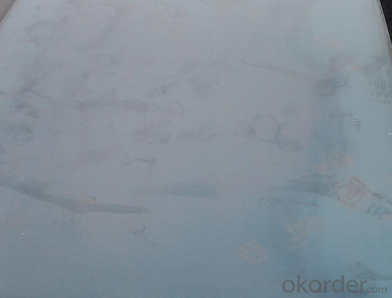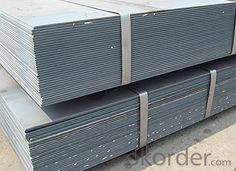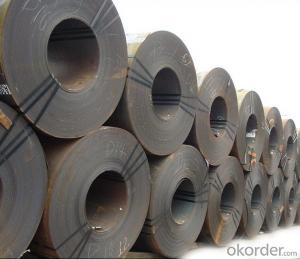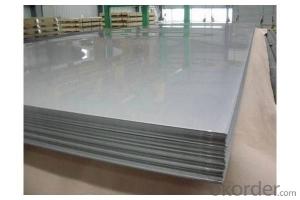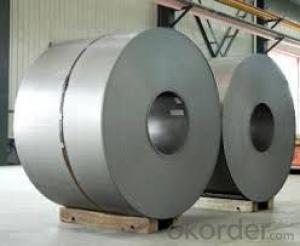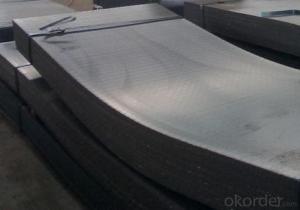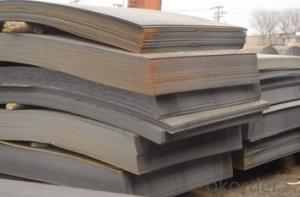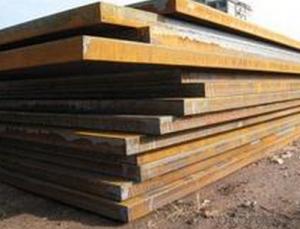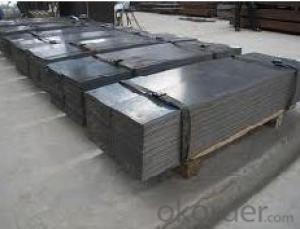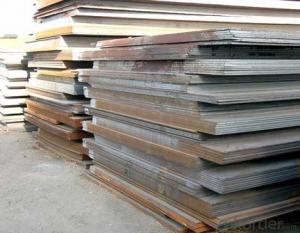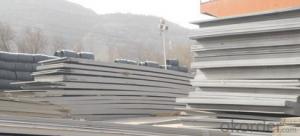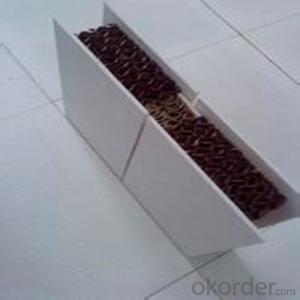Hot Rolled Carbon Steel Plate,Carbon Steel Sheet 20R, CNBM
- Loading Port:
- Qingdao
- Payment Terms:
- TT OR LC
- Min Order Qty:
- 10 pc
- Supply Capability:
- 30 pc/month
OKorder Service Pledge
OKorder Financial Service
You Might Also Like
Quick Details
| Standard: | AISI, ASTM, GB, JIS | Grade: | Q195,Q235,Q345,A36,C45 | Thickness: | 1.0-30MM |
| Model Number: | Q235,Q195,Q345 | ||||
| Type: | Steel Plate | Technique: | Hot Rolled | Surface Treatment: | Coated |
| Application: | Ship Plate | Special Use: | Silicon Steel | Width: | 30-2000mm |
| Length: | as your requirement | standard: | hot rolled | Surface: | Anti-rust oil |
Packaging & Delivery
| Packaging Details: | seaworthy packages or as customers' require |
| Delivery Detail: | within 15 days after the advance payment |
Hot rolled steel plate
1 carbon steel plate 3mm thick General information
| Product name | Type | Specification | Implementation of GB | ||
| thick | wide | long | |||
| Carbon structural steel | Q195,Q215, Q235A,Q235B, Q235C,Q255, Q275 | 4-120 | 1500-4500 | 6000-12000 | GB/T700-2006 |
| Low-alloy structural steel | Q295,Q345A, Q345B,Q2345C | 4-120 | 1500-4500 | 6000-12000 | BG/T1591-1994 |
| Quality carbon structural stee | 30-50 | 4-120 | 1500-4500 | 6000-12000 | BG/T699-1999 |
| Ship steel | CCSA,CCSB | 4-120 | 1500-4500 | 6000-12000 | materials and welding condition |
| CCSAH32,CCSAH36 CCSDH32,CCSDH36 | 4-120 | 1500-4500 | 6000-12000 | materials and welding condition or GB 712-2000 | |
| Boiler steel | 20g,22Mng, 16Mng,19Mng | 4-120 | 1500-4500 | 6000-12000 | GB 713-1997 |
| Pressure vessel steel | 1622Mng,20R, 15MnVR,15MnVNR | 4-120 | 1500-2700 | 6000-12000 | GB 6654-1996 |
| European standard plate
| S235JR,S235J0, S275JR,S275J0, S275JR2,S355JR, S355J0,S355J2 | 4-120 | 1500-4500 | 6000-12000 | EN 10025 |
| Japanese standard plate | SS400,SS400-B | 4-120 | 1500-4500 | 6000-12000 | JIS G3101-2004 |
2 carbon steel plate 3mm thick detail specification
Material:
A283Gr.D/A573Gr.65,A516Gr65,A516Gr70,A284Gr.D
SS400,SS300,CCSB A36,A32,LRA32,LRB,Q235
Q195,Q235,Q345,SS400,ASTM A36,E235B
Thickness: 4mm-120mm
width: 1500mm-4500mm
Length:2-10m ,accordingly
Thickness | 4-120mm |
Width | 1500-4500mm or as custom's request |
Length | 2-12m,as your requirment |
Technique | Cold rolled or hot rolled |
Surface treatment | Bare, galvanized coated or as customer's requirements. |
Standard | ASTM,EN,GB,JIS,GB |
Material | A283Gr.D/A573Gr.65,A516Gr65,A516Gr70,A284Gr.D SS400,SS300,CCSB A36,A32,LRA32,LRB,Q235 Q195,Q235,Q345,SS400,ASTM A36,E235B |
Terms of Payment | L/C or T/T |
Chemical composition | C≤0.004%;Si≤0.030%; Mn ≤0.17%;P≤0.012%; S≤0.010%; Fe balance |
Delivery Detail | within 30days once receive deposite or confirm L/C |
Packing | Standard export packing,or as requirement |
3 carbon steel plate 3mm thick application:
construction,machinery manufacturing, container manufacturing, shipbuilding, bridge construction. Can also be used to manufacture a variety of containers, the furnace shell, furnace plate, bridge and vehicle static steel plate, low alloy steel plate,shipbuilding plate, boiler plate, pressure vessel plate, pattern plate, tractor parts, automobile frame steel plate and welding components
- Q: How are steel sheets protected during storage in humid environments?
- Steel sheets are typically protected during storage in humid environments through a process known as corrosion prevention. This involves implementing various measures to minimize the exposure of the steel sheets to moisture and humidity, which are the primary factors that contribute to corrosion. One common method is the application of a protective coating on the steel sheets. This coating acts as a barrier between the steel and the surrounding moisture, preventing direct contact and minimizing the risk of corrosion. There are different types of coatings available, such as paint, oil, or a specialized corrosion-resistant coating, depending on the specific requirements and conditions of the storage environment. In addition to protective coatings, steel sheets can also be stored in a controlled environment with regulated temperature and humidity levels. This helps to minimize the amount of moisture in the air surrounding the steel sheets, reducing the likelihood of corrosion. This controlled environment may be achieved through the use of dehumidifiers or climate-controlled storage facilities. Furthermore, proper handling and packaging of the steel sheets can also play a crucial role in protecting them during storage in humid environments. The sheets should be stored in a way that allows for adequate airflow and ventilation to minimize the accumulation of moisture. They should also be packaged in materials that provide an additional layer of protection against moisture, such as plastic wraps or moisture-resistant packaging materials. Regular inspection and maintenance are also important to ensure the ongoing protection of steel sheets during storage in humid environments. This includes checking for any signs of corrosion or damage and promptly addressing them to prevent further deterioration. Overall, a combination of protective coatings, controlled storage environments, proper handling, and regular maintenance are essential in safeguarding steel sheets from the effects of humidity and moisture during storage.
- Q: How do steel sheets perform in fatigue resistance?
- Steel sheets generally perform well in fatigue resistance. Due to their high strength and durability, steel sheets can withstand repeated cyclic loading without experiencing significant degradation in performance. This makes them suitable for various applications where fatigue resistance is crucial, such as in automotive components, bridges, and structural elements.
- Q: Can steel sheets be used for elevator panels or interiors?
- Yes, steel sheets can be used for elevator panels or interiors. Steel is a durable and versatile material that is commonly used in elevator construction due to its strength and aesthetic appeal. It can be fabricated into various shapes and sizes to create sleek and modern elevator panels and interiors.
- Q: Are the steel sheets suitable for welding or fabrication purposes?
- Steel sheets are indeed appropriate for welding or fabrication purposes. Steel is a versatile material that finds application in a wide range of industries, such as construction, automotive, and manufacturing. When it comes to welding and fabrication, steel sheets serve as a sturdy and long-lasting foundation. They can be easily manipulated through cutting, shaping, and welding techniques like arc welding, MIG welding, or TIG welding. Steel sheets possess outstanding structural integrity and can endure extreme temperatures and mechanical strain during the welding or fabrication process. Moreover, they are obtainable in various thicknesses and grades, enabling customization in accordance with particular welding or fabrication prerequisites.
- Q: How do steel sheets compare to other types of sheet materials?
- Steel sheets have several advantages over other types of sheet materials. First, they are extremely strong and durable, making them suitable for a wide range of applications. They are also highly resistant to corrosion, which is especially beneficial in harsh environments. Additionally, steel sheets offer excellent heat and fire resistance, making them a safe choice for many industries. Furthermore, steel sheets are versatile and can be easily fabricated into various shapes and sizes. However, steel sheets can be heavier and more expensive compared to other materials, and they may require additional protective coatings to prevent rusting. Overall, steel sheets are a reliable and versatile option that offers exceptional strength, durability, and resistance.
- Q: What is the lifespan of steel sheets?
- The lifespan of steel sheets can vary depending on various factors such as the specific type of steel, the quality of the sheets, the environmental conditions they are exposed to, and the level of maintenance and care provided. However, with proper installation and maintenance, steel sheets can have a lifespan of several decades or more.
- Q: What are the electrical conductivity properties of steel sheets?
- Steel sheets have high electrical conductivity properties due to the presence of metallic bonds between iron atoms, allowing for the easy flow of electric current through the material.
- Q: Are steel sheets suitable for manufacturing elevator doors?
- Yes, steel sheets are suitable for manufacturing elevator doors. Steel is a popular choice for elevator doors due to its strength, durability, and aesthetic appeal. Steel sheets offer the necessary strength and rigidity required for elevator doors, ensuring safety and security. Additionally, steel is resistant to wear and tear, corrosion, and fire, making it a reliable material for elevator doors. Steel sheets can also be easily customized and finished to meet various design requirements, allowing for a wide range of styles and finishes. Overall, steel sheets provide the necessary qualities for manufacturing elevator doors, making them a suitable choice for this application.
- Q: Are the steel sheets resistant to atmospheric corrosion?
- Yes, steel sheets are typically resistant to atmospheric corrosion due to their protective oxide layer which acts as a barrier against rust and other forms of corrosion caused by exposure to air and moisture.
- Q: Must the welding between steel sheets be opened?
- Not necessarily, very thin plate, no opening, but also guarantee penetration, but also through nondestructive testing
Send your message to us
Hot Rolled Carbon Steel Plate,Carbon Steel Sheet 20R, CNBM
- Loading Port:
- Qingdao
- Payment Terms:
- TT OR LC
- Min Order Qty:
- 10 pc
- Supply Capability:
- 30 pc/month
OKorder Service Pledge
OKorder Financial Service
Similar products
Hot products
Hot Searches
Related keywords
